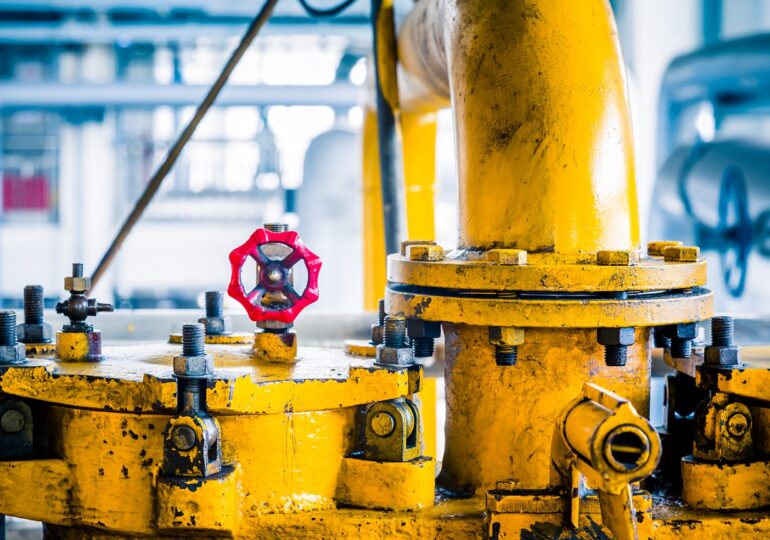More than two years after the invasion of Ukraine, Kiev has continued to allow the transit of Russian gas to Europe. This will no longer happen starting from the end of the year, Ukrainian authorities announce. The decision will impact the gas market on the continent.
Ukrainian President Volodymyr Zelensky stated this week that the authorities in Kiev will not extend the contract with Moscow that allows Russia to deliver gas through Ukraine to Europe. The Kremlin reacted immediately, criticizing the decision and warning that it will create uncertainty for many European countries that buy Russian gas.
The agreement valid until December was financially beneficial for both Kiev and Moscow, but had become increasingly inappropriate for Ukraine's strategy to target Russian energy infrastructure. It made no sense for Ukraine to consume significant military resources to target energy units on Russian territory while allowing Moscow's exported gas to pass through Ukraine unhindered. Additionally, Ukraine had no moral right to accuse European countries importing Russian gas as long as Kiev had an agreement with Moscow.
The contract between the Ukrainian company Naftogaz, the state operator of the GTSOU pipelines, and the Russian giant Gazprom signed in 2019 expires on December 31. It stipulated a minimum transit volume of 65 billion cubic meters of gas in 2020 and 40 billion in the 2021-2024 period.
At the time of signing, Zelensky appreciated the conclusion of the contract, stating that it would bring at least $7 billion in revenue to Ukraine, as Kyiv Post reminds.
Transited volumes decreased after the invasion of Ukraine, as the European Union reduced imports of Russian gas and Kiev closed two entry points for Russian gas into the country.
In 2023, Russia exported 14.6 billion cubic meters of gas through Ukraine, nearly two-thirds less than the volume of 41.6 billion cubic meters in 2021. By comparison, in the years before the COVID pandemic, annual transit volumes reached 80 billion cubic meters.
Europe has become dependent on cheap gas
Europe's gas imports from Russia plummeted by 90% after Russia's invasion in 2022, while purchases from the United States, Norway, Azerbaijan, and Algeria increased.
However, some countries are still dependent on Russia due to their geographic position. According to the EU, 69% of Slovakia's gas imports and 60% of Austria's in 2023 came from Russia.
Brussels maintains that states affected by the closure of transit through Ukraine will have "other supply solutions." For example, Italy has reduced its dependence on Russian gas by turning to Algeria. Slovakia, on the other hand, located far from the sea, lacks alternatives.
When neighbors fight, everyone loses
Gazprom, a major source of revenue for the Russian government, has faced financial difficulties after the EU drastically reduced imports of Russian gas. Experts cited by the Russian economic publication Vedomosti estimated that the loss of Ukrainian transit routes cost Gazprom an additional $5.5 billion per year, or 6% of its revenues.
Ukraine also stands to lose. Currently, Kiev collects around $800 million from transit fees, approximately 0.5% of GDP, although most of these revenues went towards operating costs. From January, Ukraine will no longer receive this money.
The Ukrainian transit route accounted for only half of Russia's gas exports to Europe.
Approximately 42 million cubic meters pass daily through the Sudzha measuring station in the Russian Kursk region, the last open entry point for Russian gas heading to Ukraine. The route became uncertain earlier this month after Ukrainian forces captured the station during the military incursion into Russia. However, gas delivery continued.
Increasingly limited options for Moscow and European customers
After the sabotage of the Nord Stream underwater pipelines in September 2022, Russia was left with limited options for increasing gas deliveries to Europe.
An important alternative route is the TurkStream pipeline, which transports Russian gas through the Black Sea to Turkey and then to Bulgaria, Serbia, and Hungary via the Balkan Stream network.
Europe also purchases liquefied natural gas (LNG), but capacity is limited by available port facilities, transport ships, and cargo.
An alternative to the Ukrainian transit route is transporting gas by ships from Azerbaijan to Europe and then transferring it to the continental transport network. Zelensky has stated that discussions are ongoing with Baku on this matter, but the most feasible options would still involve using Russian infrastructure to a certain capacity.
Another option would be for Russia to increase deliveries through the Turkish route. However, there are capacity limitations here as well, although Vladimir Putin aims to develop a gas hub in Turkey.
The Kremlin's spokesperson, Dmitry Peskov, confirmed that Russia could find alternative routes, such as the planned gas hub in Turkey. "There are (other) routes, but, of course, such decisions by the Ukrainian side will seriously damage the interests of European consumers, those who still want to buy Russian gas more reliably, more affordably," Peskov said.
He added that Europe will need to pay more for gas from other suppliers, including liquefied natural gas purchased from the United States.
By December, Russia and its European customers will need to find a viable solution. Ukraine is determined to sever one of the last anchoring links it had with Moscow, delivering another serious blow to the Kremlin.

